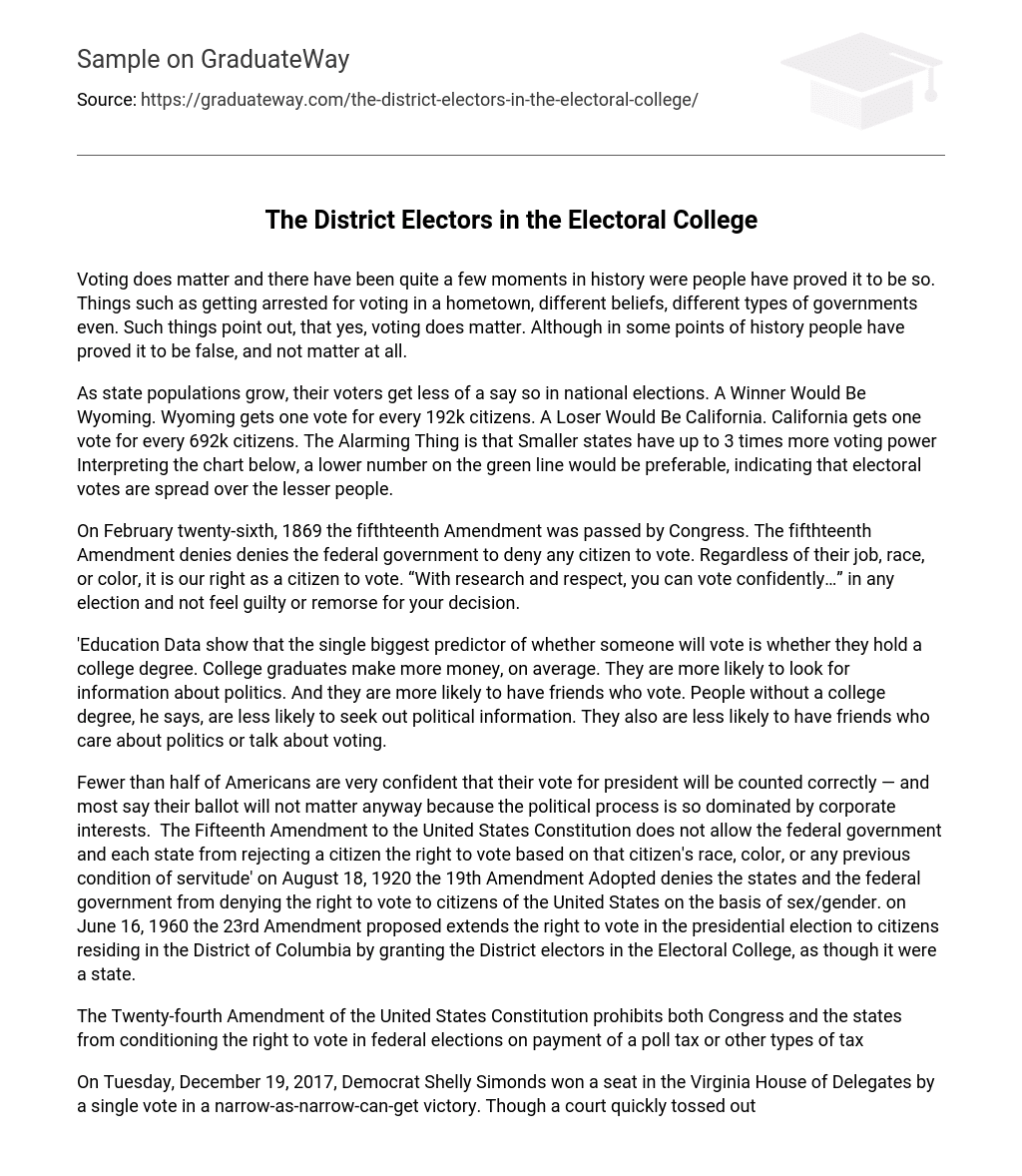Voting does matter and there have been quite a few moments in history were people have proved it to be so. Things such as getting arrested for voting in a hometown, different beliefs, different types of governments even. Such things point out, that yes, voting does matter. Although in some points of history people have proved it to be false, and not matter at all.
As state populations grow, their voters get less of a say so in national elections. A Winner Would Be Wyoming. Wyoming gets one vote for every 192k citizens. A Loser Would Be California. California gets one vote for every 692k citizens. The Alarming Thing is that Smaller states have up to 3 times more voting power Interpreting the chart below, a lower number on the green line would be preferable, indicating that electoral votes are spread over the lesser people.
On February twenty-sixth, 1869 the fifthteenth Amendment was passed by Congress. The fifthteenth Amendment denies denies the federal government to deny any citizen to vote. Regardless of their job, race, or color, it is our right as a citizen to vote. “With research and respect, you can vote confidently…” in any election and not feel guilty or remorse for your decision.
‘Education Data show that the single biggest predictor of whether someone will vote is whether they hold a college degree. College graduates make more money, on average. They are more likely to look for information about politics. And they are more likely to have friends who vote. People without a college degree, he says, are less likely to seek out political information. They also are less likely to have friends who care about politics or talk about voting.
Fewer than half of Americans are very confident that their vote for president will be counted correctly — and most say their ballot will not matter anyway because the political process is so dominated by corporate interests. The Fifteenth Amendment to the United States Constitution does not allow the federal government and each state from rejecting a citizen the right to vote based on that citizen’s race, color, or any previous condition of servitude’ on August 18, 1920 the 19th Amendment Adopted denies the states and the federal government from denying the right to vote to citizens of the United States on the basis of sex/gender. on June 16, 1960 the 23rd Amendment proposed extends the right to vote in the presidential election to citizens residing in the District of Columbia by granting the District electors in the Electoral College, as though it were a state.
The Twenty-fourth Amendment of the United States Constitution prohibits both Congress and the states from conditioning the right to vote in federal elections on payment of a poll tax or other types of tax
On Tuesday, December 19, 2017, Democrat Shelly Simonds won a seat in the Virginia House of Delegates by a single vote in a narrow-as-narrow-can-get victory. Though a court quickly tossed out Simonds’s victory, and she eventually ended up conceding to her Republican opponent, it’s not the only time an election came down to a single ballot. Though a one-vote win is rare, it has happened before. On more than one occasion.
Bush squeezed by Gore in Florida by a certified count of 537 in 2000, or the U.S Senate, where a two-vote margin led to a revote in a 1974 New Hampshire election. But only one time in the 20th or 21st century has a single vote made the difference in roughly 18,000 House elections: a 1910 contest for Buffalo, New York’s congressional district, where Democrat Charles B. Smith snuck by incumbent De Alva S. Alexander by a single vote, 20,685 to 20,684
In 2008, an Indian politician named C.P. Joshi lost by a single vote pursuing an assembly position in the North West Indian state of Rajasthan. In the final tally, Joshi fell to opponent Kalyan Singh Chouhan by a count of 62,216 to 62,215. Kalyan Singh Chouhan’s wife allegedly cast votes at two different polling stations.
Our early democracy was openly, even crudely transactional. Voters expected to get some very real material benefit in exchange for their support. They were rewarded with hard cider and whiskey at polling places, where they were usually required, in turn, to declare whom they were voting for. New York’s Tammany Hall and other nineteenth-century political machines expanded this system by handing out “walking-around money” and commonly paying $2 a vote at polling places in broad daylight.
If voting did not matter, then why would political machines bargain with immigrents or even people in general? That’s because it is their JOB to make sure that their candidate makes office, so they NEED the votes.





